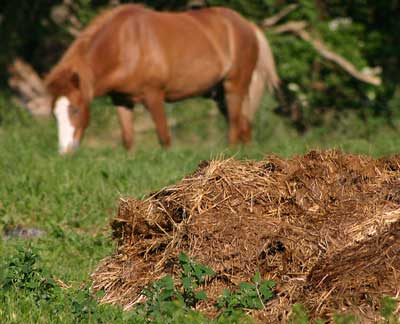“Where there’s muck…..”
Posted by on Mar 27, 2011 in General News, Horses | 0 commentsAn unavoidable part of keeping equines is the fact that they produce manure….manure in great quantities! On average a horse will produce about 8-12 piles of poo a day, that could be more that 22kg a day for just one horse.
If you are managing your paddocks by ‘poop scooping’ or have your horses in and muck out each day, you will, like many of us be wondering what to do with all this by-product. Well the obvious solution, especially useful at this time of year, is to turn it into compost for your garden (or someone else’s and make a few €’s!) or back onto the paddocks as fertilizer. With a little bit of effort you can have the following benefits:
- Decrease the volume of waste by over 50%
- Composted manure is easier to handle than rotted manure
- Reduces the possibility of parasite transmission between horses. The heat generated during composting kills worm larvae
- Reduces fly problems by eliminating the breeding ground
- Reduces odours
Firstly find a location for your compost pile on compacted soil or an impervious surface to lessen the seepage of nutrients and salts into the ground, ideally with a slight slope to help drain water away. Keep the pile away from natural water ways so as not to affect aquatic life.
The basic ingredients for composting are nitrogen materials (horse manure, fresh grass cuttings, veg peelings), carbon materials (dried straw, hay, shavings etc), water and air.
The moisture content will need to be managed slightly to keep it at about 60%, depending on the time of year, to ensure that the essential microbes can survive. You may need to either add water or cover the pile, if this is possible.
Turn the pile often to mix the contents and to provide oxygen to the microbes. Doing this will also help to ensure your pile doesn’t smell bad (caused by anaerobic organisms).
Decomposition of organic matter by microbes produces heat. The optimal temperature range of your pile should be between 50 and 62 degrees Celsius. These high temperatures will kill pathogens and weed seeds. Don’t allow temperatures to rise much higher or the microbes will also die.
Et voila, in 1 to 3 months your compost should be ready to use!

